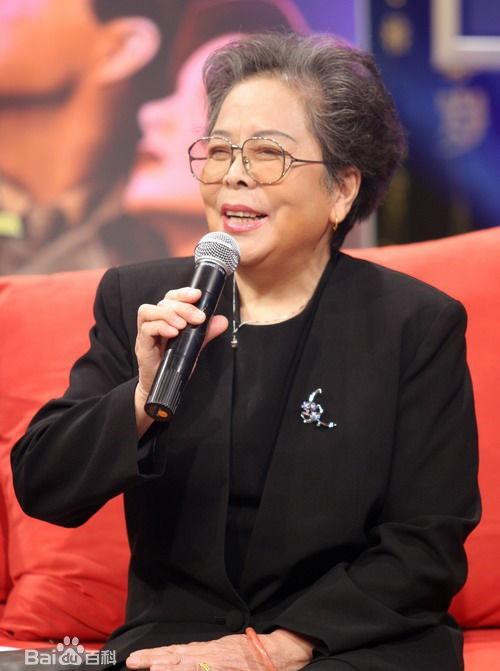<h1 class="pgc-h-arrow-right" > the first generation of voice actors in New China - Li Zi</h1>

The first generation of voice actors in New China - Li Zi
Film dubbing has always been a mysterious and infinite work in the eyes of the audience, and the voice actors are also known as "heroes behind the screen", and Li Zi is one of the heroes behind the screen.
In 1954, as the first generation of voice actors in New China, Li Zi embarked on the dubbing position of translation and production. In more than 40 years of dubbing career, she has created a variety of characters that are lifelike and unique. This is inseparable from her love and pursuit of art.
At the age of 16, Li Zi was admitted to The Third Girls' High School in Beiping, actively participated in the student movement of "anti-civil war, anti-persecution, survival and freedom" under the leadership of progressive teachers and students, and served as a liaison between the Third Girls' High School and the Peking University Progressive Student Movement Leadership Center. After being persecuted by the reactionary authorities and expelled from the school, she simply united several classmates with her fierce temperament, and in the autumn of 1948, she went on foot to the Liberated Area of Shandong and entered East China University to study, and was later assigned to the East China University Literary and Labor Troupe, becoming a revolutionary literary and artistic female fighter, and showing extraordinary artistic talent in operas and dramas such as "Brothers and Sisters Open the Wilderness", "Ideological Problems", and "White-Haired Girl".
After dubbing the former Soviet film "Kiev Girl", the old factory director Chen Shu said to her in a serious tone: "Good sounds are very good, but it always gives people a smooth, porcelain-like feeling..." After repeated thinking, Li Zi realized that most of the characters he portrayed were gorgeous and sweet, but lacked the shortcomings of the character personality. Therefore, in the future work practice, she deepened the excavation of the theme of the film, repeatedly deliberated on the inner feelings of the characters, carefully pondered the personality characteristics of the characters, and took a key step in the transformation into a character actor.
In the 1970s, after the release of "Jane Eyre" in China, the audience was immediately attracted to the stubborn woman with low status but not humble, and all this should be attributed to the behind-the-scenes hero who gave the character a strong life with her voice - Li Zi. "Jane Love is one of my favorite characters and one of my deepest roles. At that time, I threw my whole body into it, and my heart was really like turning the sea upside down, sometimes a short sentence, only a few words, but the inner thing was pressed, and it would erupt at any time. There is a scene in the film where, when we first meet, in the face of Rochester's question of whether he can play the piano or not and whether he can paint oil, Jane Eyre answers six "will points" in a very contemptuous tone. After carefully pondering the psychology of the characters, Li Zi gave six answers to different emotions, some heavy and angry, some gently resentful, and some suppressed and counterattacked... Perfectly showing the character's full and strong emotions and ups and downs, she said: "Only such an abundant emotion will have a good voice acting mood and give the character a special style." ”
In 1971, when dubbing the Mexican film "Yesenia", Li Zi vividly reproduced the image of a gypsy girl who was passionate, unwavering in love and full of wildness through the skillful treatment of the girl's voice and intonation. In 1983, the heroine of the film, Jacqueline Andrei, came to Visit China, hugged her excitedly after watching the film voiced by Li Zi, and announced to everyone: "I can speak Chinese!" This work enabled Li Zi to complete the successful transformation from a natural actor to a character actor.
As an excellent voice actor, Li Zi's voice is thick and changeable, and he is still able to successfully voice a young girl more than half a hundred years old. In the 1980s, in the Japanese movie "Wangxiang", there was a touching scene in which a female reporter and Azaki Po cherished other things, and her dedicated performance shocked all the staff on the scene. She also has a unique job, which is to voice a little boy. She did an excellent job dubbing the boy in the Spanish film The Blind Man. The dubbing of Heinche in the West German film "Handsome Boy" is Li Zi's classic, and she accurately grasped the characteristics of the boy's voice in her fifties, and the singing voice of the "little teenager" in the film and her lines are reflected in the voice, which is still evocative. In 1990, the 60-year-old Li Zi was invited by director Xie Tieli to voice Jia Baoyu in the movie "Dream of the Red Chamber", and this work also became Li Zi's closing work.
On the screen, Li Zi used a mature and lively, noble and sexy voice to create a series of classic images with unique styles and extremely glorious styles, such as graceful and luxurious noblewomen, debauched and flirtatious prostitutes, feminine and amorous maidens, fierce and vicious female guards, dignified and deep female scientists. In life, she has always been calm and introverted, adhering to the creative principle of "entering the heavens and the earth, following closely, bending and turning, and following the trend", and interpreting countless perfect lives with a changeable voice. In the corridor of Chinese translation and production, she is like a shining star, shining eternally in the Milky Way...
Excerpted from "The Style of the Towel" - China Pictorial Publishing House